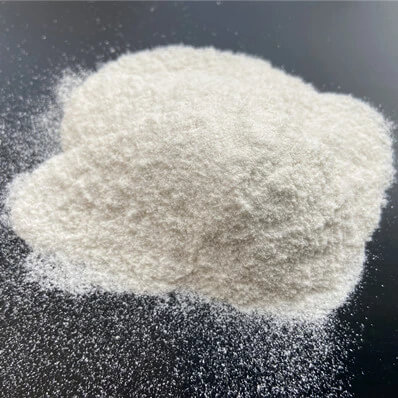Name:
Other Names:
CAS No:
Product No:

Name:
Other Names:
CAS No:
Product No:
Chitosan Feed Grade
Deacetylchitin; Poly-(D)glucosamine
9012-76-4
39139000
Chitosan feed grade is a natural feed additive derived from chitin, a substance found in the shells of crustaceans like shrimp and crabs. As a versatile and eco-friendly supplement, chitosan has gained popularity in animal nutrition due to its antimicrobial, prebiotic, and immunomodulatory properties. When added to animal feed, chitosan supports gut health, promotes beneficial bacteria, enhances nutrient absorption, and strengthens immunity. These benefits contribute to improved growth, higher feed efficiency, and a healthier, more resilient animal. By reducing the need for antibiotics and lowering environmental waste, chitosan feed grade offers a sustainable approach to animal production.
| Test Items | Specifications |
| Appearance | Off-white or light-yellow semitransparent flake or powder |
| D.A.C | ≥80%; ≥85% |
| PH | 6.5-8.5 |
| Moisture | ≤12.0%; |
| Ash | ≤2.0%; ≤3.0% |
| Insoluble | ≤2.0% |
| Viscosity | 20-1200 mpa.s at 20°C with 1% chitosan in 1% acetic acid. |
| Mesh Size | 40 mesh/60 mesh/80 mesh/100 mesh |
1. Antimicrobial Action
Binds to Pathogens: Chitosan has a positive charge that allows it to bind to negatively charged cell walls of pathogens like bacteria and fungi. This binding disrupts the microbial cell walls, leading to leakage of intracellular contents and eventual cell death.
Reduces Pathogen Load: By inhibiting the growth of harmful bacteria (e.g., E. coli, Salmonella), chitosan lowers the pathogenic load in the gut, reducing the risk of infections and promoting a healthier gut flora balance.
2. Gut Health Improvement
Prebiotic Effect: Chitosan selectively promotes the growth of beneficial gut bacteria, like Lactobacillus and Bifidobacterium, which support digestion and nutrient absorption.
Enhances Gut Barrier Function: Chitosan strengthens the intestinal lining, reducing permeability and preventing harmful bacteria from crossing into the bloodstream. This “gut barrier” effect is key in maintaining overall animal health and preventing systemic infections.
Modulates Gut pH: Chitosan lowers the pH in the gut, creating a more acidic environment that discourages the growth of harmful bacteria while supporting beneficial microbes.
3. Immunomodulatory Effects
Activates Immune Cells: Chitosan can activate macrophages, neutrophils, and other immune cells, which helps the animal’s immune system respond more effectively to infections.
Stimulates Cytokine Production: Chitosan promotes the release of cytokines (small proteins that signal immune responses), enhancing the animal’s ability to combat pathogens.
Reduces Inflammation: Chitosan’s immune-modulating effects can reduce excessive inflammation, particularly in the gut, allowing animals to maintain better health and growth.
4. Enhancement of Nutrient Absorption
Improves Digestive Enzyme Activity: Chitosan increases the activity of enzymes that aid in digesting proteins, carbohydrates, and fats, helping animals extract more nutrients from feed.
Binds Toxins and Heavy Metals: Chitosan has chelating properties, meaning it can bind to and neutralize toxic compounds, heavy metals, and mycotoxins in the gut, preventing their absorption and helping to reduce toxic load.
5. Antioxidant Properties
Reduces Oxidative Stress: Chitosan has antioxidant properties, which protect cells from damage caused by free radicals. This is especially beneficial under stress conditions, like changes in diet or environment.
Supports Cellular Health: By reducing oxidative damage, chitosan helps maintain healthy cellular function, contributing to better overall health and resilience against disease.
6. Growth Promotion and Feed Efficiency
Enhances Growth Hormones and Metabolic Processes: Some studies suggest chitosan can influence hormone levels related to growth, such as insulin-like growth factor, improving overall growth rates.
Increases Feed Efficiency: With a healthier gut and better nutrient absorption, animals require less feed to gain weight, making chitosan an effective additive to improve feed conversion ratios (FCR).